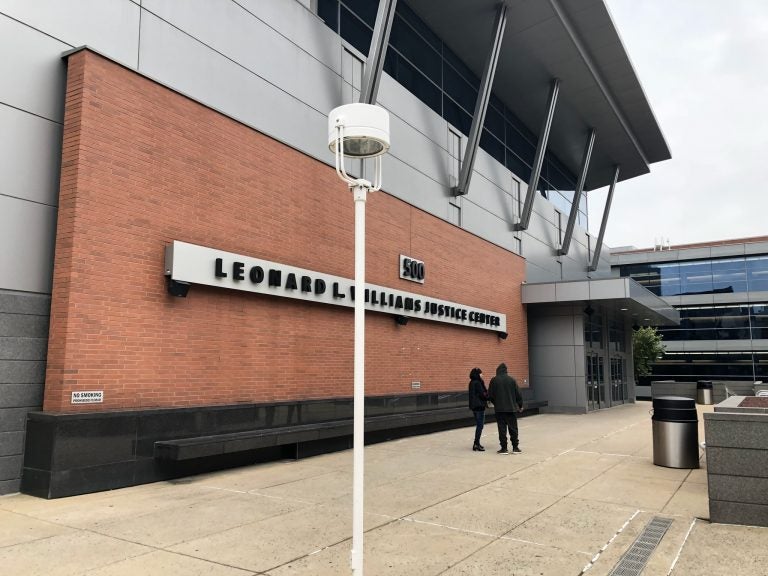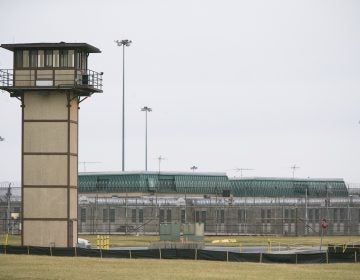Jury in first Delaware prison riot trial convicts two, one of murder
A jury has found one of three inmates charged in a deadly 2017 prison riot in Delaware guilty of felony murder and murder of a law enforcement officer while on duty.
Listen 1:48
A 12-member jury are deliberating charges against inmates allegedly involved in a prison riot (Cris Barrish/WHYY)
Updated: 6:37 p.m.
A jury has found one of three inmates charged in a deadly 2017 prison riot in Delaware guilty of felony murder and murder of a law enforcement officer while on duty.
The jury convicted Dwayne Staats on all charges except for intentional murder in connection with the 18-hour uprising at the James T. Vaughn Correctional Center near Smyrna, which left correctional officer Lt. Steven Floyd dead.
After three days of deliberations, the jury also found Jarreau Ayers guilty on charges of riot, conspiracy, kidnapping, and assault.
A third defendant, Deric Forney, was found not guilty on all counts in the first of several trials of all 18 inmates charged in connection with standoff.
Ayers and Staats, who represented themselves at trial, already are serving life sentences for murder. Forney, who is serving 11 years for various firearm and drug convictions, will be released in 2023 if he serves his entire sentence.
Throughout the four-week trial, the defendants testified that they wanted to protest poor conditions at the prison, but they never intended to kill Floyd.
Prosecutors painted a grimmer picture of what happened in the prison. They said Floyd was handcuffed and placed in a mop closet, while two other officers were confined in a supply closet. An inmate wielding a knife allegedly put a bag over a counselor’s head and bound her feet while holding her captive in her office. The counselor was not physically harmed, and was even protected by some inmates, but was not released, prosecutors said.
The correctional officers trapped inside the supply closet testified they were beaten, had burning objects thrown on them, and could hear Floyd moaning in pain. Floyd died from blunt force and stabbing trauma, and was found faced down in his office, covered with debris. Coroners testified that if Floyd had been released earlier, he could have survived his injuries.
During the trial, Staats testified the whole incident was his idea, telling the jury he recruited inmates with life sentences who had “nothing to lose” to take correctional officers hostage. He said six inmates were involved, but he refused to name them. Staats said he organized the prison takeover because peaceful protests did nothing to address poor conditions. He insisted he never intended the takeover to turn deadly.
Ayers testified he wanted to organize a peaceful protest and didn’t partake in the deadly siege. However, prosecutors pointed to a recorded phone conversation with his sister in which he asked for commissary money to stock up on peanut butter, crackers, and water, because something is “going to go down” after the Super Bowl, saying “electric cut off, water cut off, everything. Y’all gonna know about it, ya’ll gonna see it.”
Ayers argued knowing a significant incident was going to take place does not prove he was part of it.
After the verdict was announced, Forney’s attorney, Ben Gifford, said there was not nearly enough evidence to find his client guilty.
“Mr. Forney echoes he’s maintained his innocence with me from the beginning and is thankful the jury came to the same conclusion,” he said.
Department of Correction commissioner Perry Phelps declined to discuss whether the verdict constituted justice for Floyd, but he commended the jury’s dedication.
“I appreciate the jury, they’ve committed about five weeks of their lives to evaluating the evidence and coming to a decision on this, and we appreciate their time and we want to thank them,” he said. “We also want to thank the prosecutor’s office and state police for tirelessly pursuing these convictions … it will be one step forward for the DOC family, and we’re ready to move toward healing process.”
Ayers, who represented himself, said through his stand-by counsel that he “appreciates the jury’s hard work and sacrifice in deciding this case.”
Jurors deliberated 11 counts for each defendant, including intentional murder, felony murder, and the death of a law enforcement officer. They also had to decide whether the men were accountable for Floyd’s death, even if they didn’t assault him, because they all were part of the larger riot that led to his death.
Throughout the trial, the defense pointed to multiple flaws and holes in the investigation.
There is no DNA evidence or video surveillance, so prosecutors relied heavily on the testimonies of inmates and survivors of the uprising, as well as phone conversations and audio of the negotiation process. The defense also painted the prosecutors’ witnesses as inmates ready to lie to get plea deals.
In December, the state paid $7.5 million to settle a lawsuit filed by six workers in the Department of Correction and five others — including Floyd’s widow and children. The lawsuit was filed against the DOC and former Govs. Jack Markell and Ruth Ann Minner, as well as other prison and budget administrators. They were accused of failing to properly fund and operate the DOC and its facilities.
An independent review of the prison found a dysfunctional, adversarial culture between prison leaders and the rank-and-file, and correctional officers and inmates, both of which, the report states, contributed to the deadly siege.
Carney has budgeted funds to address some of the issues outlined in the report.
WHYY is your source for fact-based, in-depth journalism and information. As a nonprofit organization, we rely on financial support from readers like you. Please give today.



